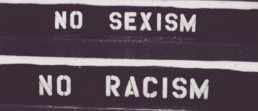Somewhere in Adidas headquarters in Herzogenaurach, Germany, there are folks who look like they’ve just crawled out of a flaming dumpster after writing a corporate statement about the Kanye West/Adidas saga. This blog post is about the work they did.
The Story in a Nutshell
The story began way back in September, when West was firing shots at the German footwear company in interviews and on social media. He had publicly called out CEO Kasper Rorsted, posted pictures of Adidas board members, accused the company of not giving him enough control over the
Yeezy sneaker line and told CNBC “they were copying my ideas.”
Media really started paying attention on October 3, when the artist turned up at Paris Fashion Week alongside right-wing provocateur Candace Owens wearing “White Lives Matter” t-shirts. Data gathered by Newswhip showed an uptick in supportive stories on conservative news sites like Daily Wire and Brietbart in the days that followed.
On October 6, Adidas responded by announcing it had put its relationship with West “under review.”
In the days immediately following, West unleashed a torrent of anti-Semitic comments on social media, reaching a new low on October 16 when he said: “I can say anti-Semitic things, and Adidas can’t drop me. Now what? Now what?”
On October 25 — months after the fighting between West and Adidas had started and weeks after Tweeting that he would go “death con 3 on JEWISH PEOPLE” — Adidas finally released a statement dropping the artist and — in the process — kicking him off the Forbes billionaires’ list after his net worth dropped from $2 billion to $400 million.
What goes into a Corporate Statement
As someone who has written hundreds of statements over a long career, I can imagine that dozens of people within Adidas — from legal teams, to senior execs and the CEO — would have been looming over the shoulders of the writing team. It couldn’t have been easy.
Let’s evaluate their work:
The Opening Paragraph
The company statement starts out with a strong moral statement: “Adidas does not tolerate antisemitism and any other sort of hate speech. Ye’s recent comments and actions have been unacceptable, hateful and dangerous, and they violate the company’s values of diversity and inclusion, mutual respect and fairness.”
It’s best to open a statement that cuts to the emotional core of the issue. Whether that’s expressing empathy or strong moral resolve, you want to show you understand the emotional environment around an issue. Adidas has tried to do that here.
However, they reacted slowly. The review – which started on October 6 — took place weeks after West fired shots at the company and the statement came after weeks of controversy. If Adidas truly doesn’t tolerate antisemitism, the response should have been immediate.
In fact, they shouldn’t have signed West at all. In 2013, right around the time West left Nike and started working with Adidas, he told a radio interviewer that: “People want to say Obama can’t make these moves or he’s not executing. That’s because he ain’t got those connections. Black
people don’t have the same level of connections as Jewish people.” Adidas knew West was antisemitic years ago.
The risk in using words like “does not tolerate” is that your past actions – or inactions – also come back to haunt you. Of all the paragraphs in the statement, this one is the least convincing, and most problematic.
Grade: F
The Second Paragraph
The writers followed this with: “After a thorough review, the company has taken the decision to terminate the partnership with Ye immediately, end production of Yeezy branded products and stop all payments to Ye and his companies. Adidas will stop the Adidas Yeezy business with immediate
effect.”
This is the “process paragraph.” After laying out why you are acting, you spell out what actions you will take. In a statement like this one, the first paragraph takes a ton of time and effort. The second one is easy. Just tell the people what you’re going to do.
That said, the line “will stop the Adidas Yeezy business with immediate effect” sounds like it may have been translated from the original German. I might have just written “immediately.”
Grade: B-
The Third Paragraph
This is where it gets spicy again: “This is expected to have a short-term negative impact of up to €250 million on the company’s net income in 2022 given the high seasonality of the fourth quarter.”
In this paragraph, the company tells investors and the market what the expected fallout will be in sales. Ordinarily, this line would have been checked, re-rechecked and agonized over. No one wants to admit that sales are going to plummet.
But wait just a minute: Adidas stock was already down 64% in 2022. Sure, the fight with West didn’t help that, but the company was already facing declining sales and has been missing quarterly targets. This seems like a great way to cover your tailspin.
Grade: B+
The Kicker
The last paragraph is delicious: “Adidas is the sole owner of all design rights to existing products as well as previous and new colorways under the partnership. More information will be given as part of the company’s upcoming Q3 earnings announcement on November 9, 2022.”
I don’t often praise lawyers for their writing, but this is legal gold. Adidas is staking out its legal claim to the designs to Yeezy footwear, opening the possibility that the company will produce the same shoes without the Yeezy brand. They are very likely on strong legal ground, but this does open the intriguing possibility that the story isn’t over yet, and that West may well challenge the company’s claim to what he clearly believes is his creative intellectual property.
Shots fired.
Paragraph score: A+
HOWEVER: Total score: D-
Because, as good as parts of this statement are, ultimately it’s the defense of the indefensible. Adidas made a mistake signing West in 2013, at minimum they should have cut him loose immediately in September, and the company doesn’t acknowledge any of that. There isn’t a
statement in the world that can fix bad decision-making, no matter how expertly written.
Lloyd Rang
President and Narrative Lead for Curious Public. Lloyd is one of Canada’s leading communications and crisis management experts.


